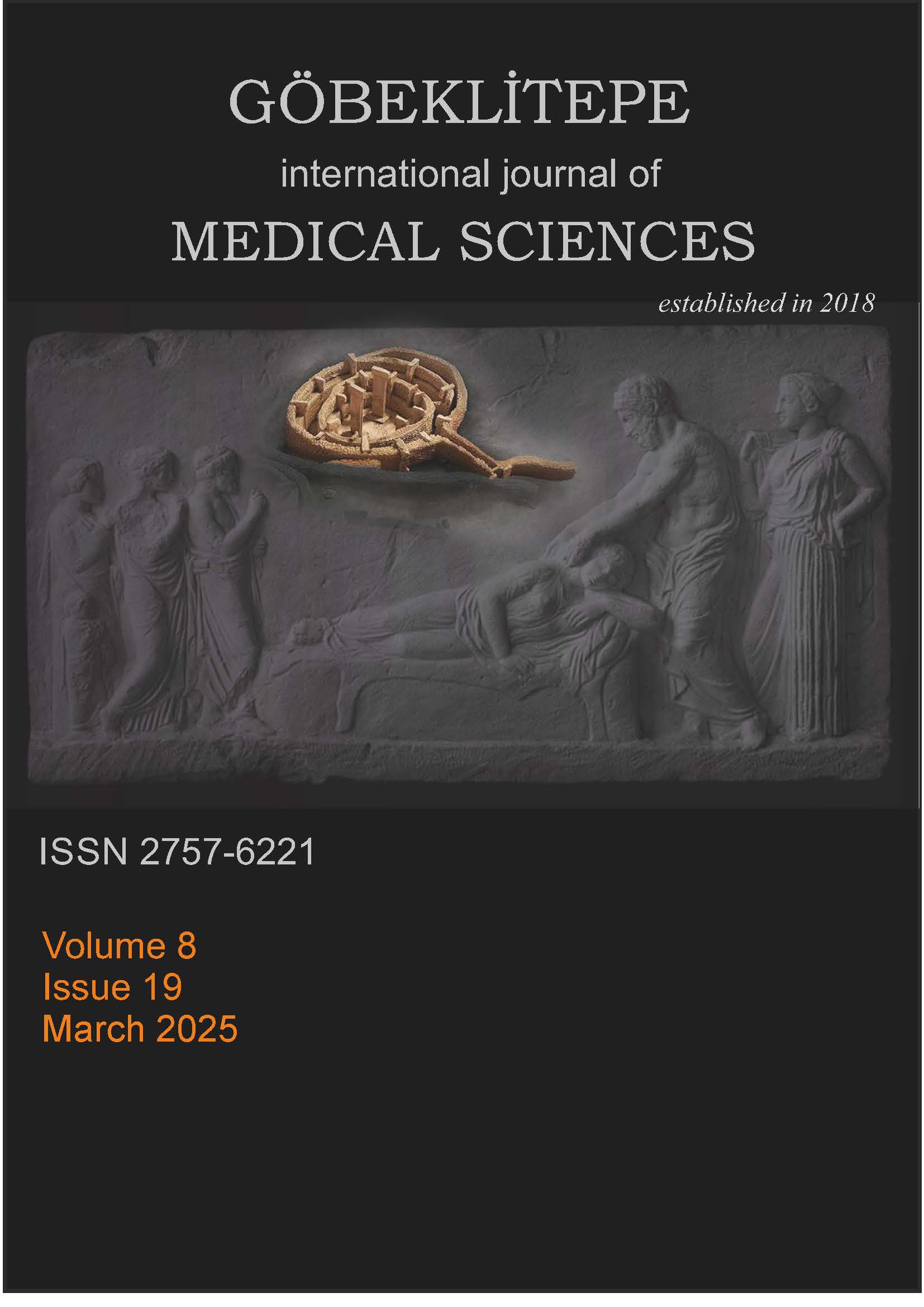DETERMINING THE ETHICAL PROBLEMS EXPERIENCED BY NURSING STUDENTS IN CLINICAL EDUCATİON
Abstract
This study was conducted as descriptive and cross-sectional to determine the ethical problems experienced by nursing students in clinic education, with 350students of a foundation university in Istanbul. Data were collected using an information form and a Scale of Ethical Problems in clinical education. Data were evaluated using the SPSS 21 program using number, percentage, mean, Mann-WhitneyU and Kruskal-Wallis tests.It was determined that 37.7% of the students experienced ethical problems,24.6% experienced ethical dilemmas in clinical practices.The students stated that the ethical principles most frequently violated in the problems they experienced were;benefit, non-maleficence, equality, and privacy, respectively.It was stated that the ethical values violated when they experienced ethical problems were mostly human dignity and honesty. When they experienced ethical problems, 24.9% of the students stated that they made ethical decisions, 8.9% stated that they could not make ethical decisions, and 8.3% stated that they had no idea. The total score of the Scale of Ethical Problems experienced by the students in clinical education was found to be 146.72±39.21. A significant difference was found between the ethical problem scores according to the students' gender, the number of clinical practice, and the status of experiencing ethical problems in clinical practice (p<0.05).
References
Henderson V.(2006) The concept of nursing. Journal of Advanced Nursing 53(1): 21-34. https://doi.org/10.1111/j.1365-2648.2006.03660.x
Karaöz S. (2013) Hemşirelik eğitiminde klinik değerlendirmeye genel bakış: güçlükler ve öneriler. DEUHYO ED 6(3): 149-158. https://dergipark.org.tr/tr/download/article-file/753477
Boztepe H, Terzioğlu F.(2013) Hemşirelik eğitiminde beceri değerlendirme. Anadolu Hemşirelik ve Sağlık Bilimleri Dergisi 16(1):57-64. https://dergipark.org.tr/tr/pub/ataunihem/issue/2660/34382#article_cite
Lin L, Hou YY, Wang XH, Han YX. (2014) Graduate students as preceptors: Effects on clinical teaching outcomes of medical nursing. International Journal of Nursing Sciences 1(2): 202- 206. http://dx.doi.org/10.1016%2Fj.ijnss.2014.05.008
Topuksak B, Kublay G. (2010) Florence Nightingale’den günümüze hemşirelik eğitiminde neler değişti? avrupa ve türkiye’de modern hemşirelik eğitimi, Maltepe Üniversitesi Hemşirelik Bilim ve Sanatı Dergisi Sempozyum Özel Sayısı: 298-305.
Ünsal C, Öcal G, Demiral M, Alsan G, Mumcu HK. (2013) Trabzon’da bir sağlık yüksekokulunda okuyan öğrencilere klinik uygulamalarda öğretim elemanlarının uyguladığı etik ilke ihlalleri. Gümüşhane Üniversitesi Sağlık Bilimleri Dergisi 2(3): 12-24.
Killam LA, Heerschap C.(2013) Challenges to student learning in the clinical setting: A qualitative descriptive study. Nurse Education Today 33(6): 684- 691. DOI: 10.1016/j.nedt.2012.10.008.
Ünver V, Cinar Fİ, Yüksel C ve ark.(2013) Hemşirelik son sınıf öğrencilerinin acil servis klinik uygulamasına ilişkin görüşlerinin incelenmesi. Hemşirelikte Eğitim ve Araştırma Dergisi 10 (3): 12-17. 1305-0397 / 2618-5741.
Hemşirelik Ulusal Çekirdek Eğitim Programı (HUÇEP) (2014). http://www.hemed.org.tr/images/stories/hucep-2014-pdf.pdf (25.09.2016).
Kurban NK,(2015) Hemşirelikte klinik öğretim, içinde: hemşirelikte öğretim ve eğiticinin rolü eğitim, değerlendirme ve müfredat geliştirmede en iyi uygulama için eksiksiz rehber (1.Baskı), Arslan S, Kurban NK, Anı Yayıncılık, Ankara, s 167-188.
Valiee S, Moridi G, Khaledi S, Garibi F.(2016) Nursing students’ perspectives on clinical instructors’ effectivete aching strategies: A descriptive study. Nurse Education in Practice 16 (1): 258-262. doi: 10.1016/j.nepr.2015.09.009. Epub 2015 Oct 8.
Park HA, Cameron ME, Han SS et al. (2003) Korean nursing students’ ethical problems and ethical decision making. Nursing Ethics Journal 2 10(6): 638- 653. PubMed ID 14650482
Ramos FR, Brehmer LC, Vargas MA et al.(2015) Ethical conflicts andt heprocess of reflection in undergraduate nursing students in Brazil. Nursing Ethics 22 (4): 428-439. doi: 10.1177/0969733014538890. Epub 2014 Aug 4.
Aitamaa E, Leino-Kilpi H, Puukka P, Suhonen R.(2010) Ethical problems in nursing management: The role of codes of ethics. Nursing Ethics 17(4): 469-482. 18-22,
Nolan PW, Markert D.(2002)Ethical reasoning observed: a longitudinal study of nursing students. Nursing Ethics Journal 9(3): 243-258. doi: 10.1191/0969733002ne507oa.
Erdil F, Korkmaz F.(2019) Ethical problems observed by student nurses. Nursing Ethics Journal 16(5): 589-598. doi: 10.1177/0969733009106651.
Yeh MY, Wu SM, Che HL.(2010) Cultural and hierarchical influences: ethical issues faced by Taiwanese nursing students. Medical Education 44: 475-484.
Solum EM, Maluwa VM, Severinsson E.(2012) Ethical problems in practice asexperienced by Malawian student nurses. Nursing Ethics 19(1): 128-138.
Willassen E, Blomberg AC, Post I, Lindwall L.(2015) Student nurses’ experiences of undignified caring in perioperative practice - Part II. Nursing Ethics 22(6): 688-699.
Akutay S, Ceyhan Ö. (2022) Hemşirelik öğrencilerinin klinik öğretimde etik sorun yaşama durumlarının belirlenmesi. Gümüşhane Üniversitesi Sağlık Bilimleri Dergisi 1452-1459
Kırşan M.(2019) Hemşirelikte klinik öğretimde etik sorunlar ölçeği geliştirme. İzmir Katip Çelebi Üniversitesi Sağlık Bilimleri Enstitüsü Hemşirelik Esasları Anabilim Dalı, Yüksek Lisans Tezi. İzmir4.
Gümüşler Başaran, A.(2020) “Hemşirelik bölümü son sınıf öğrencilerinin intörnlük uygulamasında karşılaştığı sorunlar, tutumları ve etik açıdan değerlendirmeleri”. Eurasian Journal of Health Sciences 3 (3), 177-183.
Akın Korhan, E., Ceylan, B., Üstün, C.,ve Kırşan M.(2018) “Hemşirelik öğrencileri gözüyle klinik alanda etik sorunlar”. Ege Tıp Dergisi, 57(2), 75-81.
Haahr, A, Norlyk, A, Martinsen, B. and Dreyer, P. (2020). “Nurses experiences of ethical dilemmas: a review”. Nursing Ethics, 27 (1), 258-272.
Papastavrou E., Efstathiou C., Andreou C.(2016) Nursing students’ perceptions of patient dignity. A Review Nursing Ethics, 23(1)
Küçük S., Uysal N., Çakırer N., Kahriman İ., Altundağ S., Gönenç İ. (2017) Hemşirelik öğrencilerinin etik karar verme düzeyleri ve etkileyen faktörlerin belirlenmesi. 3:157
Callister, L.C., Luthy, K.E, Thompson, P., and Memmott, R.J. (2009). “Ethical reasoning in baccalaureate nursing students”. Nursing Ethics, 16(4), 499-510.
Parandeh A., Khaghanizade M., Mohammadi E., Nouri J.M. (2014) Factors ınfluencing development of professional values among nursing students and ınstructors: A Systematic Review 7(2) :284-293
Kızılırmak A., Calpbinici P. (2018)Hemşirelik öğrencilerinin etik duyarlılıkları ile eleştirel düşünme eğilimleri arasındaki ilişki. Erciyes Üniversitesi Sağlık Bilimleri Dergisi 21:192-198.
Park, M., Kjervik, D., Crandell, J., Oermann, M.H, (2012) The relationship of ethics education to moral sensitivity and moral reasoning skills of nursing students. Nursing Ethics. 19: (4)
Suntur Ş.,(2018) Duran S. Hemşirelik öğrencilerinin etik duyarlılık düzeylerinin belirlenmesi 17. Ulusal Hemşirelik Öğrencileri Kongresi Bildiri Kitabı;255.
Salar, A.R, Zare, S. and Sharifzadeh, E. (2016) “The survey of nursing students’ ethical sensitivity”. Biology and Medicine, 8 (5), 1-4.
Özyer, K. ve Azizoğlu, Ö. (2010). “Demografik değı̇şkenlerin kı̇şı̇lerı̇n etı̇k tutumları üzerı̇ndeki etkı̇lerı̇”. Ekonomik ve Sosyal Araştırmalar Dergisi, 6 (2), 59-84.
Bayrak Aykan, E, Eren Fidancı, B. ve Yıldız D. (2019). “Hemşirelik öğrencilerinde ahlaki olgunluk ve etik duyarlılığın değerlendirilmesi”. SBÜ Hemşirelik Dergisi, 1 (2), 84-91.
Ordu Y..(2019) Examining the studies on determining the ethical awareness levels of nursing students. Turkish Journal of Bioethics. 6(3): 116-121 DOI: 10.5505/tjob.2019.80774.
Downloads
Published
Versions
- 2025-07-23 (2)
- 2025-03-28 (1)
How to Cite
Issue
Section
License
Copyright (c) 2025 Göbeklitepe Medical Science Journal

This work is licensed under a Creative Commons Attribution 4.0 International License.




